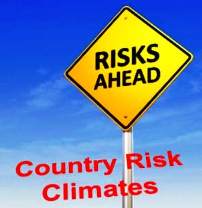 Bahrain – elections that fail to unite;
Bahrain – elections that fail to unite;- Central Asia – the Russian ruble’s nosedive is having repercussions across the region;
- Iran – the good and the bad of a missed deadline;
- OPEC – how to sustain a cartel in a bear market.
CAYMAN ISLANDS: The economy appears to have moved onto a stronger growth track after a period of relatively little advancement. Looking ahead, the fact that the US is in a recovery mode should help the tourism and service sectors. The authorities, fortunately, have backed down from plans to impose a direct income tax on expats.
HONG KONG: Beijing will not cede its control over the leadership election in 2017 and is, basically, hoping it will win a “war of attrition” with the pro-democracy protesters. There are now signs that the economy has taken a hit, but the government has scrapped restrictions on buying renminbi in preparation for the launch of the Shanghai-Hong Kong Stock Connect program.
IVORY COAST: The economy is doing quite well and the prospects for 2015 are encouraging. The country has regained the confidence of international investors after defaulting twice on its debt since 2000. President Alassane Ouattara’s seems to have a clear path to re-election next year, but some uncertainties remain.
PORTUGAL: In a stepped-up crack-down on corruption high officials have been arrested and even the incumbent PM has come under suspicion. The potential for an all-out political crisis is still limited, but international lenders have been attacking the government for dragging the reins on reform.
SURINAME: The economy is suffering because of the weakness of gold and oil prices. Despite a deterioration of the external accounts, official reserves have held up pretty well. While there is political stability, though, it is under the leadership of a shady character.
TANZANIA: The country’s hopes of becoming an exporter of natural gas keep being delayed, partly for political reasons and in part because of pervasive corruption. Whether next year’s presidential elections resolve the problem remains to be seen. The economy is not doing badly, but containing the current-account BoP deficit is a problem.
TUNISIA: The presidential run-off next month will complete a remarkable path to democracy. Then a new government will be formed, and the leading Islamist party has shown its willingness to work with the secularists. There is much to be done on the economic front, but with an encouraging political outlook the task should be easier.
VENEZUELA: Worries about a debt default by the regime are rising again, after a brief spell of optimism in the markets. A bolivar devaluation in the near future is now being taken as pretty much a foregone conclusion. One might assume that the political opposition benefits from all this, but so far the evidence is conflicting.
This page is provided by S.J. Rundt & Associates, Inc., specialists in country risk assessment, consultants to multinational companies & banks, and publishers of Rundt’s World Business Intelligence and The Financial Executive’s Country Risk Alert. To order a subscription or individual issues of these reports, in print or by e-mail, contact S.J. Rundt & Associates, P.O. Box 1572, Montclair, NJ 07042; Telephone: (973) 731-7502, Fax: (973) 731-7503; E-mail: info@rundtsintelligence.com; Web site: www.rundtsintelligence.com.























